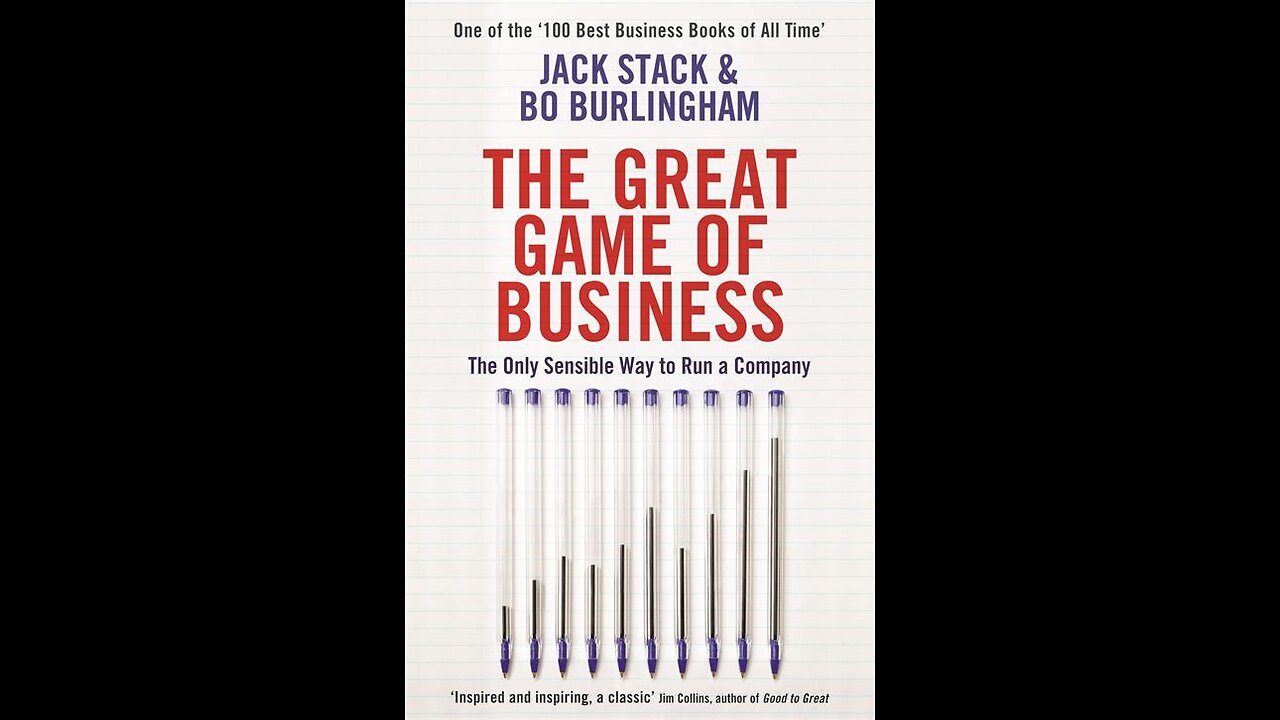Premium Only Content

The Great Game of Business by Jack Stack | Summary
Buy Here: https://amzn.to/44EnwqX
"""The Great Game of Business"" by Jack Stack is a groundbreaking book that outlines the principles and practices of open-book management, a management philosophy that involves sharing financial information and involving employees in the decision-making process. Stack shares his experiences of transforming a failing company into a thriving business by implementing these principles and creating a culture of ownership and accountability.
Here is a summary of the key ideas and principles discussed in ""The Great Game of Business"":
1. Open-Book Management: The book advocates for transparency and sharing financial information with employees, allowing them to understand the financial health of the company and their impact on its success. By involving employees in the financial aspects of the business, they can make informed decisions, set goals, and contribute to the company's bottom line.
2. Creating a Stake in the Outcome: Stack emphasizes the importance of creating a sense of ownership and accountability among employees. By sharing the financial rewards and consequences of the company's performance, employees become more engaged, motivated, and committed to achieving the company's goals.
3. Building a High-Involvement Culture: The book highlights the significance of creating a culture that encourages employee involvement and participation. Stack suggests implementing systems like employee committees, huddles, and cross-functional teams to foster collaboration, creativity, and innovation.
4. Establishing Goals and Scoreboards: Stack discusses the importance of setting clear goals and creating scoreboards to track progress and performance. By visualizing and measuring key metrics, employees can see how their efforts contribute to the company's success and make data-driven decisions.
5. Empowering and Developing People: The book emphasizes the importance of empowering employees and providing opportunities for learning and growth. Stack encourages leaders to delegate decision-making authority, provide training and development programs, and create a culture of continuous improvement.
6. Building a Winning Team: Stack highlights the significance of hiring and retaining the right people who align with the company's values and goals. He discusses strategies for effective recruitment, onboarding, and employee retention.
7. Financial Literacy: The book promotes the importance of financial literacy among employees. Stack suggests providing training and education to help employees understand financial statements, key performance indicators, and the overall financial health of the company.
""The Great Game of Business"" offers a transformative approach to management, focusing on creating a culture of ownership, engagement, and accountability. By implementing the principles outlined in the book, leaders can empower their employees, improve financial performance, and create a sustainable competitive advantage. It serves as a valuable resource for organizations looking to build a high-performing, financially literate workforce that actively contributes to the company's success."
-
 6:49:22
6:49:22
xBuRnTx
11 hours agoHappy Friday Everyone!
31.3K1 -
 2:34:48
2:34:48
Laura Loomer
10 hours agoEP112: MS-13 EVICTED By President Trump
70.1K43 -
 2:53:28
2:53:28
Toolman Tim
8 hours agoCommunity Gaming Night!! | Among Us
37.4K1 -
 2:34:47
2:34:47
GamerGril
8 hours agoMost Dangerous Gril This Side Of The Mississippi
29.5K3 -
 3:44:43
3:44:43
ZWOGs
9 hours ago🔴LIVE IN 1440p! - FiveM Fridays!! GTAV RP!! | Dwindle Digby | - Come Hang Out!
22.8K -
 2:05:43
2:05:43
TimcastIRL
11 hours agoTrump Admin Notifies Congress USAID Is CLOSED, Fires EVERYONE, ITS OVER w/Dan Holloway | Timcast IRL
225K162 -
 51:18
51:18
Man in America
14 hours agoClear Skies Coming? States Rally to Ban Geoengineering as RFK Jr. Calls Out ‘Toxic Dousing'
46.4K94 -
 2:22:55
2:22:55
BlackDiamondGunsandGear
15 hours agoThe time is NOW! / EDC / Preps / Load Out
20.2K -
 7:15:16
7:15:16
AirCondaTv Gaming
10 hours ago $0.69 earnedR.E.P.O. - Tonigth's Gonna Be a Good Night (Collab)
16.8K -
 2:03:06
2:03:06
Ninety7Bravo
10 hours ago🔴 LIVE | My First Look | Atomfall | 28 Mar 2025
19.4K